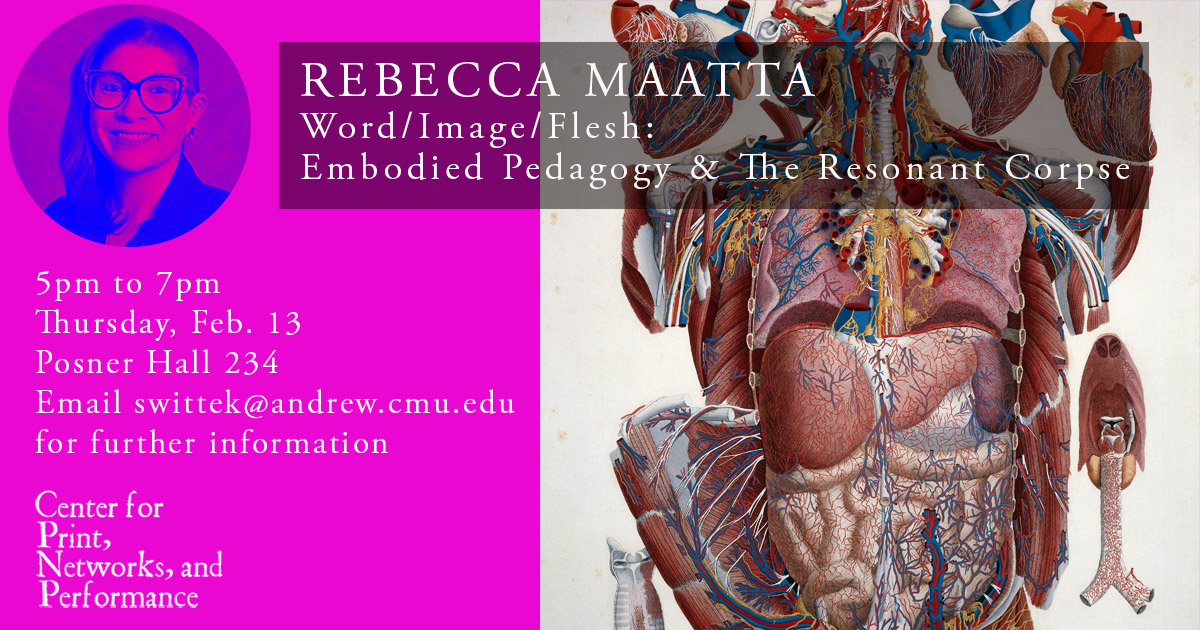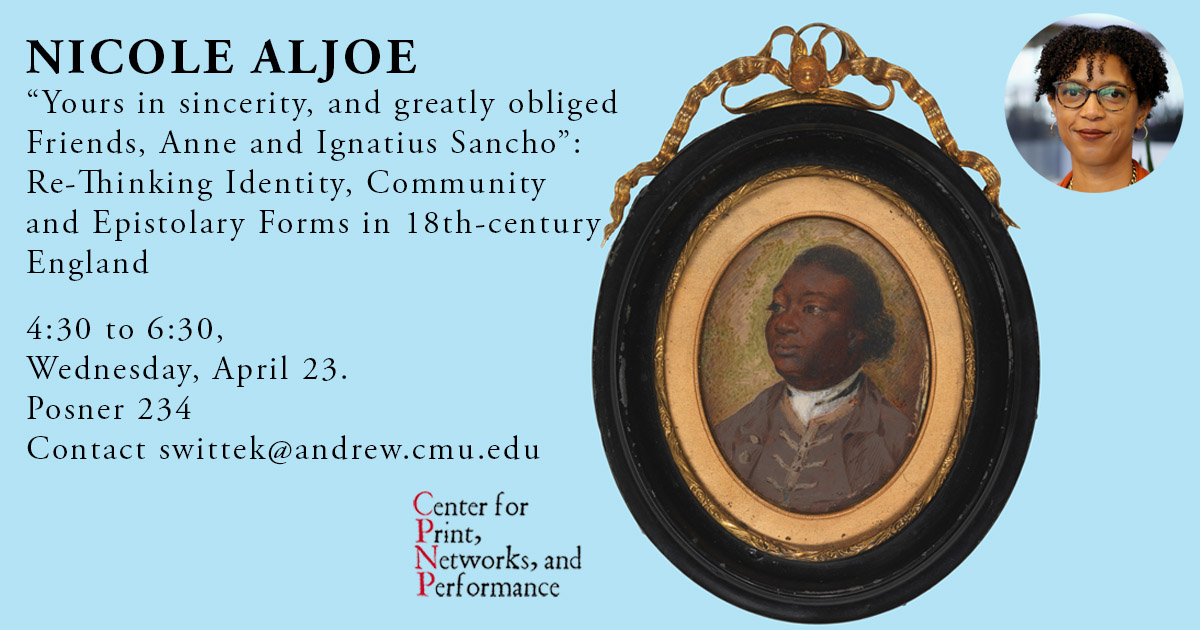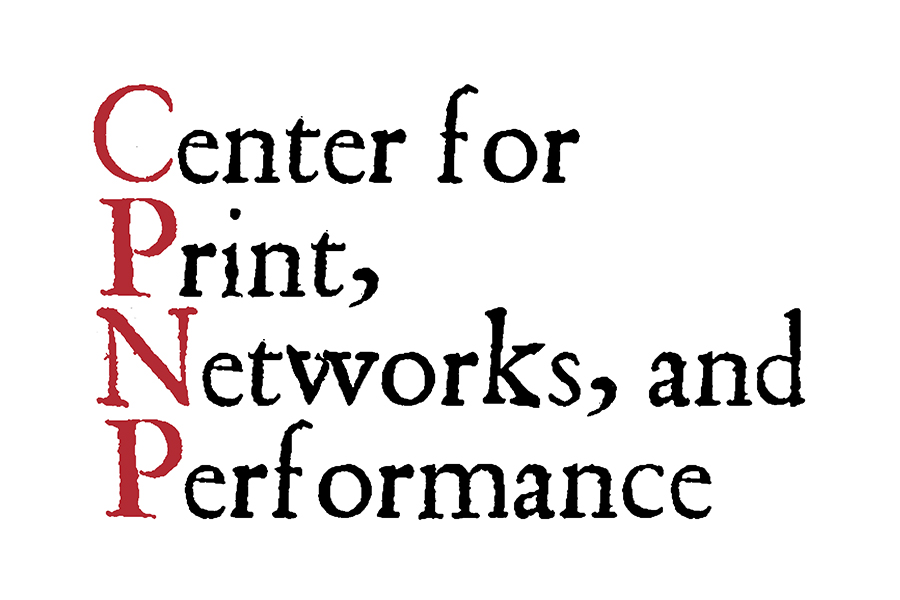The Center for Print, Networks, and Performance (CPNP)
A locus for pre-modern researchers from CMU and the greater Pittsburgh area.
The Center for Print, Networks, and Performance (CPNP) is a research hub collectively organized by CMU scholars whose work focuses on pre-modern art, culture, and politics. In addition to fostering a robust environment for pre-modern studies on campus, the Center also serves as key hub for pre-modernists based in Pittsburgh and the surrounding area. A key initiative in this respect is our speaker series, which typically entails four talks per term from a combination of local and out-of-town presenters.
To join the CPNP email list, or to make enquiries about CPNP activities, please contact Dr. Stephen Wittek (swittek@andrew.cmu.edu)
Upcoming Events

NORMAN CONTI (Duquesne University)
“Are there some histories that are off limits?”: Performing History with Incarcerated Students, Returning Citizens, Police Officers and More
Thursday, Jan. 16, 4:30 to 6:00 pm
Posner Hall 234
Norman Conti is a professor of sociology at Duquesne University and co-founder of the Elsinore Bennu Think Tank for Restorative Justice. He specializes in police socialization, ethnography, and social psychology. In this talk, he will discuss his work as an organizer and instructor for Inside-Out, a prison education program that brings university students into correctional institutions to study alongside incarcerated peers. He will also discuss the pedagogical affordances of “performative autoethnography,” a type of theatrical performance where individuals use their personal life experiences as a means to explore broader historical themes.

Word/Image/Flesh: Embodied Pedagogy & The Resonant Corpse
5pm to 7pm
Thursday, Feb. 13
Posner Hall 234
The human gross anatomy lab is an emotional, cognitive, and ethical proving ground for students in allied health and medicine. Representations of corpses abound, in textbooks and dissection guides, in lecture slides, in models lining the shelves. At the center of it all, however, is the human body donor: the “first patient” the student will know intimately and yet never know at all. This presentation will show how I use pre-modern anatomical atlases and collections, along with principles of embodied pedagogy, to, first, help students accept their physical and emotional reactions to their donor, second, to build a framework of ethics to guide their dissections, and, lastly, to explore a series of contradictions specific to human dissection. Please note that this presentation will feature photographs and illustrations of dissected human beings from times when consent was not required and when members of minority groups were especially targeted for dissection.
Rebecca Maatta is a Teaching Associate Professor in the Department of English at Duquesne University where she teaches classes in writing and the health humanities. She also co-teaches anatomy to students in allied health and specializes in assisting students with the emotional and cognitive challenges of dissecting human body donors. Her scholarship has most recently appeared in Essays in Romanticism and The Romantic Circles Praxis series.

NICOLE ALJOE
“Yours in sincerity, and greatly obliged Friends, Anne and Ignatius Sancho”: Re-Thinking Identity, Community and Epistolary Forms in 18th-century England
Wednesday, April 23
Posner Hall 234
Drawing on digital literary analysis and the work of the intergenerational and trans-national research project, Mapping Black London, this talk will explore the myriad ways in which letters by Black Britons not only contribute to complicating assumptions about identities, place and communities of Black people in 18th-century England, but also reveals a more expansive understanding of the discursive investments and formal diversity of Early Black print cultures.
Dr. Nicole Aljoe is Professor of English and Africana Studies at Tufts University. Her research focuses on 18th and early 19th Century Black Atlantic and Caribbean literature with a specialization on the slave narrative and early novels. She is the author of Creole Testimonies: Slave Narratives from the British West Indies, 1709-1836 (2012) and co-editor of the collections Journeys of the Slave Narrative in the Early Americas (2014) and A Literary History of the Early Anglophone Caribbean: Islands in the Stream (2018).
